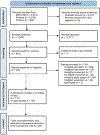Complementary and Alternative Therapies for Genitourinary Syndrome of Menopause : An Evidence Map
- PMID: 39250808
- PMCID: PMC12270004
- DOI: 10.7326/ANNALS-24-00603
Complementary and Alternative Therapies for Genitourinary Syndrome of Menopause : An Evidence Map
Abstract
Background: Women seeking nonhormonal interventions for vulvovaginal, urinary, and sexual symptoms associated with genitourinary syndrome of menopause (GSM) may seek out complementary and alternative medicine or therapies (CAMs).
Purpose: To summarize published evidence of CAMs for GSM.
Data sources: Ovid MEDLINE, EMBASE, and CINAHL from inception through 11 December 2023.
Study selection: Randomized controlled trials (RCTs) 8 weeks or more in duration that evaluated the effectiveness or harms of CAMs for postmenopausal women with GSM and reported 1 or more outcomes of interest, with sample sizes of 20 or more participants randomly assigned per group.
Data extraction: Data were abstracted by 1 reviewer and verified by a second.
Data synthesis: An evidence map approach was used to organize and describe trials. Studies were organized by type of intervention, with narrative summaries for population, study characteristics, interventions, and outcomes. Fifty-seven trials were identified that investigated 39 unique interventions. Studies were typically small (n < 200), and most were done in Iran (k = 24) or other parts of Asia (k = 9). Few trials evaluated similar combinations of populations, interventions, comparators, or outcomes. Most studies (k = 44) examined natural products (that is, herbal or botanical supplements and vitamins), whereas fewer reported on mind and body practices (k = 6) or educational programs (k = 7). Most studies reported 1 or 2 GSM symptoms, mainly sexual (k = 44) or vulvovaginal (k = 30). Tools used to measure outcomes varied widely. Most trials reported on adverse events (k = 33).
Limitations: Only English-language studies were used. Effect estimates, risk of bias, and certainty of evidence were not assessed.
Conclusion: There is a large and heterogeneous literature of CAM interventions for GSM. Trials were small, and few were done in North America. Standardized population, intervention, comparator, and outcomes reporting in future RCTs are needed.
Primary funding source: Agency for Healthcare Research and Quality and Patient-Centered Outcomes Research Institute. (PROSPERO: CRD42023400684).
Conflict of interest statement
Figures
References
-
- Portman DJ GM, Panel VATCC. Genitourinary syndrome of menopause: new terminology for vulvovaginal atrophy from the International Society for the Study of Women’s Sexual Health and the North American Menopause Society. Climacteric. 2014;17(5):557–63. - PubMed
-
- Portman DJ, Gass ML, Vulvovaginal Atrophy Terminology Consensus Conference P. Genitourinary syndrome of menopause: new terminology for vulvovaginal atrophy from the International Society for the Study of Women’s Sexual Health and the North American Menopause Society. Journal of Sexual Medicine. 2014;11(12):2865–72. - PubMed
-
- Simon JA, Kokot-Kierepa M, Goldstein J, Nappi RE. Vaginal health in the United States: results from the Vaginal Health: Insights, Views & Attitudes survey. Menopause. 2013;20(10):1043–8. - PubMed
-
- Kingsberg SA, Krychman M, Graham S, Bernick B, Mirkin S. The Women’s EMPOWER Survey: Identifying Women’s Perceptions on Vulvar and Vaginal Atrophy and Its Treatment. J Sex Med. 2017;14(3):413–24. - PubMed
-
- Mili N, Paschou SA, Armeni A, Georgopoulos N, Goulis DG, Lambrinoudaki I. Genitourinary syndrome of menopause: a systematic review on prevalence and treatment. Menopause. 2021;28(6):706–16. - PubMed
Publication types
MeSH terms
LinkOut - more resources
Full Text Sources
Medical



